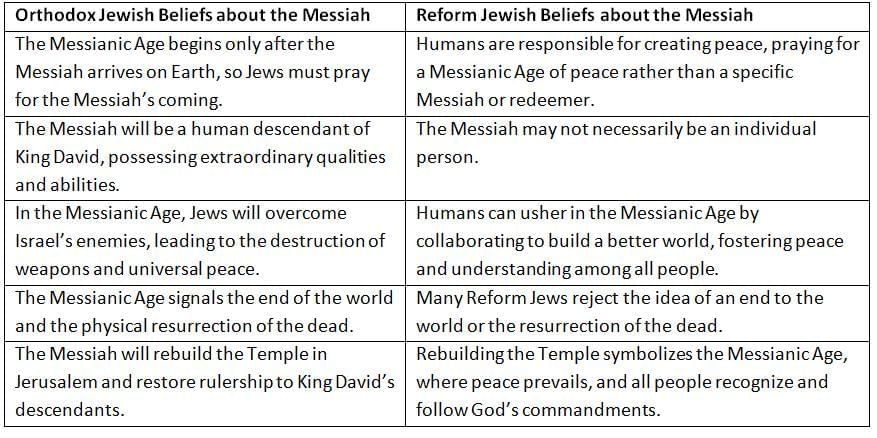Year 11 Exam > Year 11 Notes > Religion, Philosophy & Ethics for GCSE/IGCSE > The Nature & Role of the Messiah
The Nature & Role of the Messiah | Religion, Philosophy & Ethics for GCSE/IGCSE - Year 11 PDF Download
The Concept of the Messiah in Judaism
Who is the Messiah in Judaism?
The term "Messiah" derives from the Hebrew word Mashiach, meaning "anointed one" or a chosen leader destined to rule.
In the Tenakh, the term initially described the kings of Israel:
- The first king, Saul, was anointed by the prophet Samuel to signify his divine selection as ruler.
- While the Torah lacks explicit references to the Messianic Age, certain verses are interpreted as alluding to it:
“He shall not judge by what his eyes see, nor decide by what his ears hear, but with righteousness he shall judge the poor, and decide with equity for the meek of the earth; he shall strike the earth with the rod of his mouth, and with the breath of his lips he shall slay the wicked” (Isaiah 11:1–9).
- Although the Torah does not mention the "Messiah" explicitly, it refers to the "End of Days," which is associated with the Messianic Age.
- In the 12th century, Maimonides included belief in the Messiah as one of the 13 Principles of Judaism.
- Some Jews believe the Messiah will usher in an era of perfect peace and prosperity on Earth during the Messianic Age.
- The Tenakh describes the Messiah as restoring the Jewish people to Israel, rebuilding the Temple, and establishing universal peace.
The Role of the Messiah
Diverse beliefs about the Messiah exist within Judaism due to the absence of direct references in the Torah, leading to varied interpretations. Orthodox and Reform Jews hold differing views on the Messiah.

The document The Nature & Role of the Messiah | Religion, Philosophy & Ethics for GCSE/IGCSE - Year 11 is a part of the Year 11 Course Religion, Philosophy & Ethics for GCSE/IGCSE.
All you need of Year 11 at this link: Year 11
|
172 docs|3 tests
|
FAQs on The Nature & Role of the Messiah - Religion, Philosophy & Ethics for GCSE/IGCSE - Year 11
| 1. What is the definition of the Messiah in Judaism? |  |
Ans. In Judaism, the Messiah, or "Moshiach," is a future leader anointed by God who will bring about a period of peace and restoration for the Jewish people and the world. This figure is expected to fulfill specific prophecies, including rebuilding the Temple in Jerusalem, gathering all Jews back to the Land of Israel, and establishing a reign of peace and justice.
| 2. What are the key roles expected of the Messiah according to Jewish tradition? |  |
Ans. The key roles of the Messiah in Jewish tradition include rebuilding the Holy Temple in Jerusalem, gathering the Jewish exiles back to Israel, restoring Jewish law and observance, bringing peace to the world, and establishing a period of universal knowledge of God. The Messiah is seen as a political and spiritual leader who will guide humanity towards a better future.
| 3. How does the concept of the Messiah differ between Judaism and Christianity? |  |
Ans. In Judaism, the Messiah is viewed as a human leader who will restore Israel and bring peace, without divine nature. In contrast, Christianity sees Jesus as the Messiah who is divine, having already fulfilled the messianic prophecies through his life, death, and resurrection. This fundamental difference in understanding the Messiah's nature and mission is a key distinction between the two faiths.
| 4. What signs or events are associated with the coming of the Messiah? |  |
Ans. Jewish teachings outline several signs that will precede the arrival of the Messiah, including the return of the Jewish people to Israel, the rebuilding of the Temple, the end of oppression and suffering, and the establishment of global peace. These prophecies emphasize a transformative period in history that will signal the Messiah's presence.
| 5. How is the belief in the Messiah reflected in Jewish prayers and religious practices? |  |
Ans. The belief in the Messiah is reflected in Jewish prayers, particularly in the Amidah (the central prayer of Jewish worship), where the coming of the Messiah is anticipated. Additionally, during holidays such as Passover and Yom Kippur, themes of redemption and hope for the future Messiah are prevalent, reinforcing the expectation of eventual salvation and restoration for the Jewish people.
Related Searches















